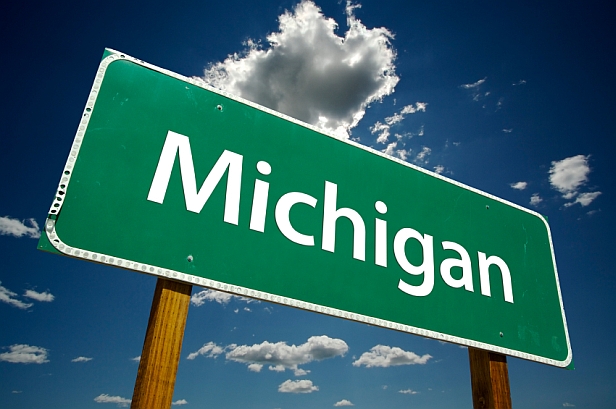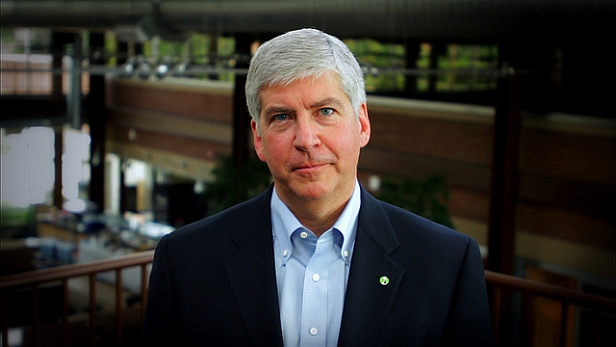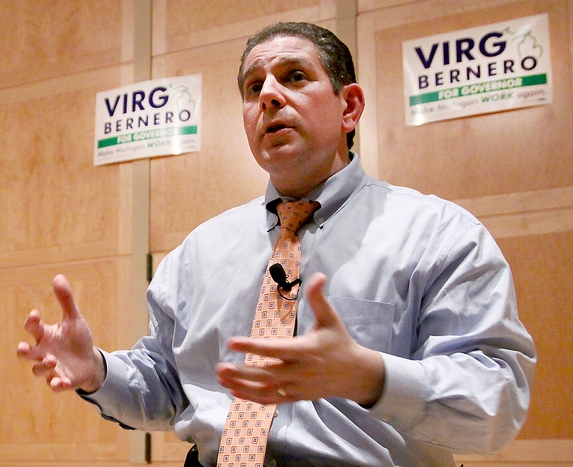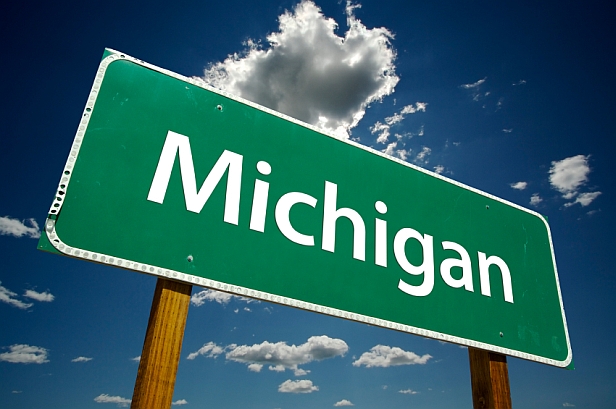 Michigan gubernatorial candidate Rick Snyder is an unusual Republican. In a year when Tea Party fervor has propelled fire-breathing extremists onto ballots around the country, Snyder comes across as a moderate, sensible Republican with crossover appeal.
Michigan gubernatorial candidate Rick Snyder is an unusual Republican. In a year when Tea Party fervor has propelled fire-breathing extremists onto ballots around the country, Snyder comes across as a moderate, sensible Republican with crossover appeal.
He’s a high-tech venture capitalist and former president of the Gateway computer company who introduced himself to voters as “one tough nerd.” His platform calls for investing in mass transit and controlling sprawl as ways to restore Michigan’s central cities. He served on the board of the Nature Conservancy’s Michigan chapter and, during the GOP primary, won the first-ever endorsement of a Republican from the state’s League of Conservation Voters.
In a primary that featured three other candidates fighting to claim the most-socially-conservative mantle, Snyder focused on the economy, attracting enough independents to win the first political race he’s entered. He began the general race against the union-backed mayor of Lansing, Democrat Virg Bernero, with an impressive 22-point advantage.
Whoever wins will confront huge challenges — Michigan has one of the highest unemployment rates in the country, 13 percent — but also big opportunities to help shape a state in transition. Michigan’s dire economic condition has made it a leading beneficiary of federal stimulus funds, which have helped fund electric-car plants, battery plants, and a light-rail plan in Detroit.
“Michigan loves Joe Biden because he’s always showing up with checks, and they’re usually for something related to next-generation energy and technology,” said Barry Rabe, a public policy professor at the University of Michigan. “Every state has this, but Michigan has done extremely well.”
The next governor will also face the challenge of upgrading Michigan’s energy system. The burst pipeline that poured tar-sands oil into a Kalamazoo River tributary this summer highlights the problems of fossil fuels (as does the struggle of the auto industry). Proposed wind farms in Lake Michigan and along the Ontario border threaten to provoke contentious siting disputes.
The state has a modest renewable electricity standard — utilities must generate 10 percent of their power from renewable sources by 2015 — and strengthening that could be a key way to attract cleantech companies.
Current Gov. Jennifer Granholm (D), who can’t run again because of term limits, was instrumental in crafting the Midwestern Greenhouse Gas Reduction Accord, a proposed regional cap-and-trade system. Backing from the next governor will be critical for putting the accord into action.
The future of coal looms as an even bigger question. Over the last two years, Granholm has made the permitting process for new coal plants much more difficult in a bid to make the state “the Silicon Valley of clean energy.” Eight proposed new coal plants have since been denied or scrapped by their backers, in part because of Granholm’s leadership and in part because of a recession-driven drop in electricity demand. But those proposed plants will resurface, said Ryan Werder of the Michigan League of Conservation Voters, and they represent just how much is at stake in the governor’s race.
Rick Snyder
 Snyder’s TV ads comparing him to other successful “nerds” like Bill Gates and Steve Jobs are odd but shrewd. They allow him to run as an outsider (one who’s done well in business) with more to offer than anger at Democrats. “We need to reinvent Michigan,” he says in one of the ads.
Snyder’s TV ads comparing him to other successful “nerds” like Bill Gates and Steve Jobs are odd but shrewd. They allow him to run as an outsider (one who’s done well in business) with more to offer than anger at Democrats. “We need to reinvent Michigan,” he says in one of the ads.
The message has appealed not just to voters but to green groups as well. The Michigan LCV endorsed both him and Democrat Bernero in the primaries and will not take sides this fall, according to Werder. “Michigan has some good choices in terms of gubernatorial candidates who will be conscious of Michigan’s clean-energy economy and sustainable future,” he said.
Creating clean-energy jobs and protecting natural resources figure prominently in Snyder’s economic-recovery pitch. So does revitalizing urban places — sorely needed in the home state of Detroit and Flint.
Snyder’s detailed “Central Cities” white paper endorses Smart Growth development principles — a rare priority for a Republican — and warns about sprawl swallowing farmland. “Green infrastructure, mass transit, and high-speed internet connectivity contribute to a ‘quality of place’ that helps provide a more practical and modern quality of life,” it states.
Snyder has not been as clear about his stance on energy issues, and hasn’t weighed in on climate change either. At a candidates forum, he said he would support new coal plants “when it’s clean coal replacing old coal.” That’s a big if, since “clean coal” has yet to become a reality anywhere.
His main plan for promoting cleantech jobs is to eliminate the Michigan business tax, a major target of state Republicans. But he’ll still have to deal with budget shortfalls ($302 million this year). The regional cap-and-trade plan has not surfaced in the campaign, but it could be a useful revenue source for cash-strapped states. (The 10 states in the Northeast’s functional cap-and-trade system have raised $662 million from carbon auctions.)
Virg Bernero
 BerneroJSmith Photo via FlickrThe Lansing mayor made an animated appearance on Fox News last year in defense of union auto workers and against Wall Street interests. The performance led to the nickname “America’s angriest mayor,” which Bernero has embraced in a new “Fighting for Main Street” tour. He probably owes his primary victory to strong union support, but it’s not clear how he’ll add to that constituency to succeed in November.
BerneroJSmith Photo via FlickrThe Lansing mayor made an animated appearance on Fox News last year in defense of union auto workers and against Wall Street interests. The performance led to the nickname “America’s angriest mayor,” which Bernero has embraced in a new “Fighting for Main Street” tour. He probably owes his primary victory to strong union support, but it’s not clear how he’ll add to that constituency to succeed in November.
He’s worked to promote the health of his struggling city, adopting a renewable energy standard and seeking to cut the city’s greenhouse gas emissions 20 percent by 2020. He’s generally embraced Smart Growth development, prioritizing historic preservation and making Lansing the first city in the state to join the EPA’s Energy
Star Challenge to improve the efficiency of commercial and industrial buildings.
Bernero’s position on energy is fairly conventional: “While oil and gas will continue to be a part of that future, it is important that we put more interest, attention, and devotion to alternative energy sources and smart technologies that use energy more efficiently.” But Werder of Michigan LCV seems satisfied — “It’s a good comprehensive plan,” he said.
Bernero’s website calls for steps that will “reduce Michigan’s carbon footprint and bring about real reductions in greenhouse gas emissions,” and also advocates “Smart Growth policies to reduce sprawl [and] revitalize cities.”
He sees cleantech as a key component of the state’s economic strategy. “Michigan, with our vacant plants and our proud manufacturing history, can lead the nation in manufacturing solar panels and wind turbines that can be used across America and across the globe,” Bernero’s website states. “Ninety percent of our nation’s wind turbines are made overseas. There is no reason why we can’t lead the way and make them in Michigan.”
Do you know more about this race? Tell us in comments below. And find out about other races in our Gubernatorial Tutorial special series.



